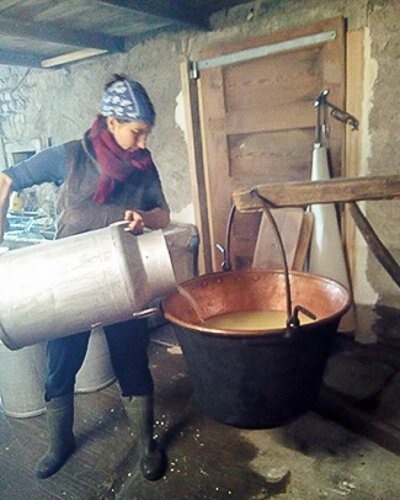If you enjoy Swiss mountain cheeses, get yourself to a shop in the next few weeks for some of the best cheese we get from Switzerland all year. Retailers across the country are just starting to receive wheels from the Alp they “adopted” several months ago, sight unseen. The eight-year-old Adopt-an-Alp program links traditional Swiss cheesemakers—the kind who make cheese only in summer in remote high-elevation huts—with American merchants who want to support these practices. We consumers get to experience phenomenal raw-milk cheeses that hardly ever left their region before. Don’t procrastinate; these gems go fast.
View from the hut on Alp Nünenen
Caroline Hostettler, a Florida-based cheese importer who is Swiss, devised this genius promotion to educate Americans about these exquisite and rare cheeses and the vanishing way of life required to produce them. These hefty alpine wheels are made by people who still practice transhumance, the centuries-old system of leading dairy animals up the mountains in late spring to take advantage of fresh grass, making cheese along the way and not descending until fall, when cold weather threatens.
It is a rigorous and often lonely way of life, says Hostettler, “more lack than luxury.” Families usually work together, but sometimes the wife and children stay at home in the valley while the husband is gone for months. Some of the mountain creameries where the cheesemakers transform the milk into cheese are well equipped, with cozy chalets nearby where hikers can stop for a plate of cheese or fondue. Other families work in much more rugged and challenging circumstances.
Cheesemakers’ daughter on Alp Imbrig
On the Alp Heuboden, source of the splendid cheese pictured above, the Tschudi family starts their climb in June from their farm at 4,000 feet. Over the next three months, they climb to 6,000 feet with cows from five farms, living in four different houses. Their final outpost is so remote that provisions and fresh clothes are delivered weekly by helicopter.
Karin Jordi is learning the art of alp cheese at Alp Imbrig
Little wonder that most Swiss cheesemakers don’t want to do this any longer. But the cheeses made from summer alpine pasture are distinctive, experts say, and likely more healthful. One Swiss study found significantly higher concentrations of beneficial fatty acids in samples of cream from cows grazing in the highlands than in the samples gathered at lower altitudes.
Hostettler had 32 Alps on her list of adoptees when she began taking orders in May. Retailers can reserve the Alp or Alps they want but must commit to a minimum purchase. Over the summer season, many mongers connect via social media or e-mail with “their” cheesemaker families.
“The cheesemakers have learned that the more they share, the more orders they have,” says Hostettler. “Some don’t have internet in the mountains and have to collaborate with children or visitors and say, ‘Would you please transmit this for me?’ It’s pretty complicated.”
Sarah Gross, Alp Nünenen
The cheeses arriving in the U.S. now are mostly from the summer of 2019, so roughly 15 months old. A few smaller cheeses arriving in November and December will be from this summer’s production. The vast majority are cow’s milk cheeses; a handful are from goat’s milk.
Every year, a panel of Swiss judges chooses the three U.S. retailers with the most creative Adopt-an-Alp promotions, and those winners get to travel with Hostettler the following summer to visit their Alp. It’s an emotional moment, says the importer. One burly cheesemonger-butcher from the Pacific Northwest was so overcome that “tears just came down his cheeks,” says Hostettler. “It was so touching for everyone.”
To be honest, says Hostettler, Alp cheesemakers don’t need us. They have no trouble selling their cheese to stores and restaurants in their region. But knowing that their cheese is going to America—“that’s like the moon,” says Hostettler—assures them their effort and skill are valued more than they realized.
Luciana Villanueva, the cheese buyer for Gus’s Market in San Francisco, chose Alp Heuboden and Alp Imbrig this year. “We’re family-owned and operated, so I wanted family-owned operations that are small and hands on,” says Villanueva. She knows the names of “her” cheesemakers, how many children they have, and she knows about the helicopter. “Now I can share their story with our customers,” says Villanueva, “and that is super-duper special.”
Look for Adopt-an-Alp cheeses at these retailers.





